Pind daan at
Brahma Kapal, Badrinath
For Hindus, Brahma Kapal is particularly significant since it is the location where people pay reverence to the souls of their ancestors. Brahma Kapal, a flat platform on the banks of the Alaknanda River, is also where loved elders’ death rites are performed.
It’s about 2 kilometres from Badrinath’s hills. All of the supplies needed to complete the seniors’ funeral rites are readily available at surrounding stores.
Watch Video->
Apart from Pind daan, Brahma Kapal is also famous for performing Tarpan
Performed for unknown pitars, to bring Moksha to them. Includes Guide Support & Tripindi Shradh Poojan at Phalgu river.
Pind daan Poojan Packages in Brahma Kapal, Badrinath:


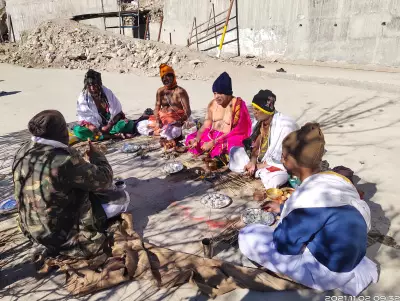
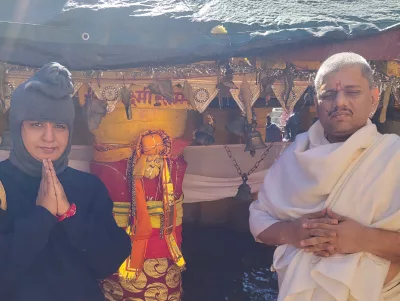
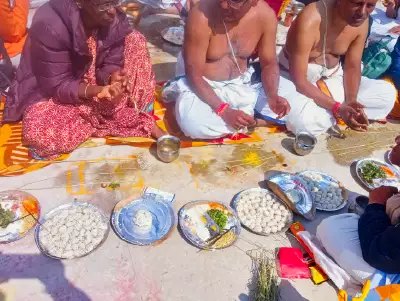
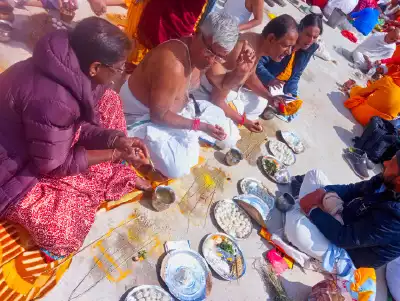

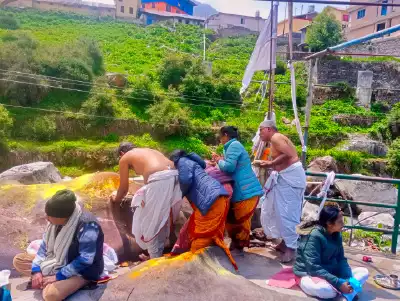
Our team conducts regular Pind Daan at Brahma kapal, Badrinath. Kindly let us know if you are planning for Pind daan at Brahma kapal Badrinath. Click here to Enquire-
It is claimed that Lord Brahma resides in Brahma Kapal and that when their family members do their last rites, or shraddha karma, here, the departed souls are freed from the cycle of birth and death. Several pundits (priests) can be found here, sitting with samagri (materials) to perform the ceremony.
The Brahma Kapal ghat is present in Badrinath Dham in the Himalayan state of Uttarakhand in India and is constantly splashed by the cool waters of the Alakananda River.
It is frequently visited by pilgrims who come to perform the Shraddha ceremony of their forefathers and mothers.
According to the Skanda Purana, doing the Shraddha ceremony at Badrinath kshetra is eight times better than performing it at Gaya kshetra. At Badrinath’s Brahma Kapal ghat, devotees conduct Shraddha for their ancestors.
This Brahma Kapal ghat is located on the banks of the sacred river Alakananda, roughly 200 to 300 metres to the left of Lord Badrinath, i.e., to the north of Badrinath temple.
This location is easily accessible by foot, and devotees can always come here to conduct Shraddha for their ancestors.
Contact Us for Pind daan in Brahma kapal
Enter details and within 24 hours we'll call you back
Leave your review
"A Hassle-Free and Heartfelt Asthivisarjan with Payag Pandits: Odia Rituals in Prayagraj"
I recently booked the full package for my mother’s asthivisarjan through “Payag Pandits,” following Odia rituals on 17th Oct’24. Mr. Shivam and Pankaj, the puja coordinators, were incredibly helpful, ensuring that everything was ready as promised on their website. The pandit was already waiting for us when we arrived at the Sangam for the puja and asthivisarjan. As soon as I met him, he greeted me with “Jay Jagannath,” which pleasantly surprised me. Although he was from Prayagraj, he performed every ritual according to Odia traditions.
We were highly satisfied with the puja. The package included everything: the pandit, puja samagri, a boat to the Sangam location, and even a barber for the mundan ritual. Mr. Shivam had explained all the details beforehand, including what to bring before leaving Bhubaneswar, which made the process very smooth. He even arranged a 2 BHK AC flat for our family at a minimal rate to stay. At the end Mr Pankaj shared our Puja video through Whatsapp, which was worth watching & showing to relatives.
Overall, the service was outstanding, and I wholeheartedly recommend Payag Pandits for anyone looking for a hassle-free and economical puja package.
thank to prayag pandit
🙏🙏
Very good service
Pooja bahut achi hui hai mai bahut khush hu
good service pragya pandit
thank you so much 🙏🙏
good service to prayag pandit
thank you 🙏 pandit ji
Frequently Asked Questions:
On the banks of the river, Tarpan, Bhoj, and Pind Daan are done suitably for the emancipation of the ancestors. Some special locations in the country have been designated for this purpose. In the country, about 55 locations are regarded as essential during Shradh Paksha.
So it is reported and believed that after conducting Shradh in Gaya, the final Shradh is conducted in Badrikashram, Uttarakhand’s ‘Brahmakapali’. After Gaya, it is the most important location. It is also said that those ancestors who do not get salvation in Gaya or elsewhere find redemption here by doing Shradh. This location is near Badrinath Dham, on the banks of the Alaknanda River.
As a result, the importance of the Brahmakapali Teerth is linked to the narrative. The Pandavas’ Story
Pind Daan was also done here by the Pandavas for the sake of their families’ tranquillity. The Pandavas, according to Shrimad Bhagwat Mahapuran, sinned killing the gotra after killing their siblings and sisters in the fight. While on the Swargarohini Yatra, the Pandavas offered their forefathers in the Brahmakapal to atone for the sin of killing the gotra. The Puranas claim that this place is home to famous ascetics and saintly souls. Great spirits reside here in subtle form, according to Shrimad Bhagwat Purana. Pind Daan, which is done at Brahma Kapali, is the last. After then, no Pind Daan or Shradh Karma for the ancestor is performed. Lord Brahma is said to reside in the shape of Brahma Kapal. Brahma had five heads once upon a time, one of which was cut off and dropped here. On the banks of the Alaknanda river, a boulder in the shape of Brahmaji’s head can still be found. Every year during Pitru Paksha, there is a large throng from Bhadrapada Shukla Purnima to Ashwin Krishna Amavasya. Brahma Kapal is considered the ultimate pilgrimage (Mahatirtha) for achieving ancestral salvation. In the Puranas, it is stated that after donating Pind in Brahmakapal, Pind Daan is no longer required. Gaya, Pushkar, Haridwar, Prayagraj, and Kashi are also ideal for Pind Daan, according to Skanda Purana, but Pind Daan done in Brahmakapal in Bhu-Vaikunth Badrinath Dham is eight times more productive than others. Shiva was set free from the guilt of slaying Brahma on the Brahma Kapalal, because he had decapitated Brahma’s fifth head.
According to the Puranas, salvation is attained by Brahmagyan, Gaya Shradh, death in a cowshed, and residency in Kurukshetra.
Brahma Kapal, located on the banks of the Alaknanda River, is a significant Hindu pilgrimage site in Badrinath.
No, there isn’t an option for online darshan.
Winters in Badrinath (November to February) are frigid, with average temperatures hovering around 5°C. During the winter, temperatures can drop below zero, and snowfall is common. These months are ideal for those who enjoy cold weather.
Summers in Badrinath are pleasant, with a somewhat cool climate, and typically continue from May through June. During these months, the temperature ranges from a pleasant 7°C to a scorching 18°C.
The ideal time to visit the temple is from May to June and September to October. It is highly recommendable to avoid late winters and monsoon seasons.
Pind daan can be done anytime while the whole year, but pitrupaksha a 18 day period before Navaratri is considered as holy time to conduct the ritual.
Pind daan is a holy ritual which is conducted after the cremation of an individual, it is an offering to our grands, so they can acquire sadgati (next stage of life after death).
Pind daan is conducted by the purohits/pandas over the banks of river in Gaya, Prayag & Varanasi. They conduct Ganga poojan, pinda poojan, tarpanam, sankalpam.
No. In the temple, all electronic devices are prohibited (viz. mobile, camera, laptop). At the temple’s entrance, there is free storage for the same.
When there are no male relatives who are ready or able to carry out Pind Daan, female relatives such as daughters and mothers can carry it out.

